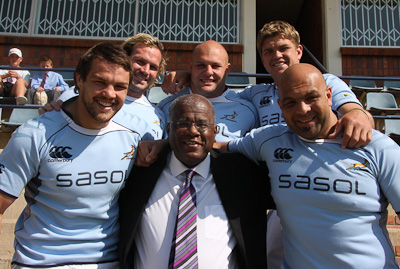Latest News Archive
Please select Category, Year, and then Month to display items
06 November 2023
|
Story MBALI MABOEA
|
Photo SUPPLIED
 The Department of Geography on the UFS Qwaqwa Campus recently played host to the Society of South African Geographers Conference (SSAG 2023), which gathered more than 100 students over three days.
The Department of Geography on the UFS Qwaqwa Campus recently played host to the Society of South African Geographers Conference (SSAG 2023), which gathered more than 100 students over three days.
Fostering academic growth, collaboration, and inspiration among students and researchers in the field of geography, the Department of Geography on the UFS Qwaqwa Campus recently played host to the Society of South African Geographers Conference (SSAG 2023), which gathered more than 100 students over three days.
Following a five-year hiatus, the three-day conference comprised student proposal presentations in different fields: human geography, environment geography, geoinformatics, and physical geography, divided into breakaway sessions over two days. Furthermore, day three of the annual conference included an excursion to the Basotho Cultural Village and Clarens.
The three-day annual student conference focused on different themes presented by two main speakers. The topic of the first keynote speaker, Dr Mahlomola Daemane, General Manager of the SANParks Arid Research Unit, focused on the contemporary conservation, transition, and relevance of science in policy and decision making.
The second keynote speaker was Dr Felicia Akinyemi, a Marie Sklodowska-Curie Research Fellow affiliated with the Institute of Geography at the University of Bern in Switzerland. Her work focuses on the intersection of geoinformatics, global change, and sustainability. Dr Akinyemi focused her talk on the integrative geospatial methods and metrics for sustainable land use. She introduced different techniques and metrics and gave students insight in early-career African research.
Speaking about the success of the conference, Nthebohiseng Sekhele, Geography Lecturer on the Qwaqwa Campus and chair of the organising committee, said, “The local organising committee was also very impressed with the quality of presentations from our postgraduate students in Geography, as well as the robust discussions that happened during the parallel sessions in the two days of the conference. We had a positive response of physical and online participation from many universities across South Africa. We are pleased that we have achieved our goal with this conference, which is to inspire the next generation of geographers.”
Springboks choose Kovsies' sports facilities
2010-09-02
 |
|
The Springbok team boasts five former Kovsies. From the left, front, are: Flip van der Merwe, Prof. Jonathan Jansen, Rector and Vice-Chancellor of the UFS, and Gurthro Steenkamp. At the back, from the left, are: Jannie du Plessis, C.J. van der Linde and Juan Smith.
Photo: Gerhard Louw
|
Over the years the University of the Free State (UFS) has already produced 67 Springbok and 22 Springbok Sevens players. Therefore it comes as no surprise that the Springboks have chosen the UFS’s sports facilities in preparation for their match against Australia this coming Saturday. They will tackle Australia at the Free State Vodacom Park at 17:00. Five former Kovsies are included in this team. They are Flip van der Merwe, Gurthro Steenkamp, Jannie du Plessis, C.J. van der Linde and Juan Smith.
Kovsies have been providing quality rugby for many decades already. During the 2009 rugby season the UFS rugby club produced 12 players for national teams and 73 players for provincial teams (all age groups). This does not include all the former Kovsies. According to Mr Rockey le Roux from KovsieSport at the UFS, there is currently not one South African Super 14 team that does not include a Kovsie or former Kovsie.
The UFS is also equipped to produce top rugby players. Shimla Park is the main field of Shimla rugby, where all the Shimla games are played. Some of the Varsity Cup games are also played on this field. Boom Prinsloo, the Shimla player named as the 2010 player of the Varsity Cup tournament, is included in the current Springbok Sevens practice team. Shimla Park boasts 1 000-lux lights, which let this field comply with international standards.
There are four more rugby fields that are used for residence rugby. Currently 26 rugby teams of the university's residences and three provincial teams practise on the fields.